Report: The Impact of COVID-19 Pandemic on Audit Quality in Jordan
VerifiedAdded on 2023/01/06
|11
|3268
|74
Report
AI Summary
This report investigates the impact of the COVID-19 pandemic on audit quality in Jordan. It begins with an executive summary and introduction that highlights the challenges faced by auditors due to social distancing and movement restrictions. The report then details the research methodology, including the research approach, data sources, and research design. A systematic review method is employed, outlining its components, challenges, and the search strategy used. The geographical focus is Jordan, and the analysis of search results utilizes qualitative methods. A critical literature review follows, examining various viewpoints on the pandemic's influence on audit practices, including pressures on auditors, increased audit risks, and the impact on financial institutions. The review discusses challenges related to remote working, access to data, and the quality of audit evidence. The report concludes with a summary of findings and their implications for audit quality in Jordan.
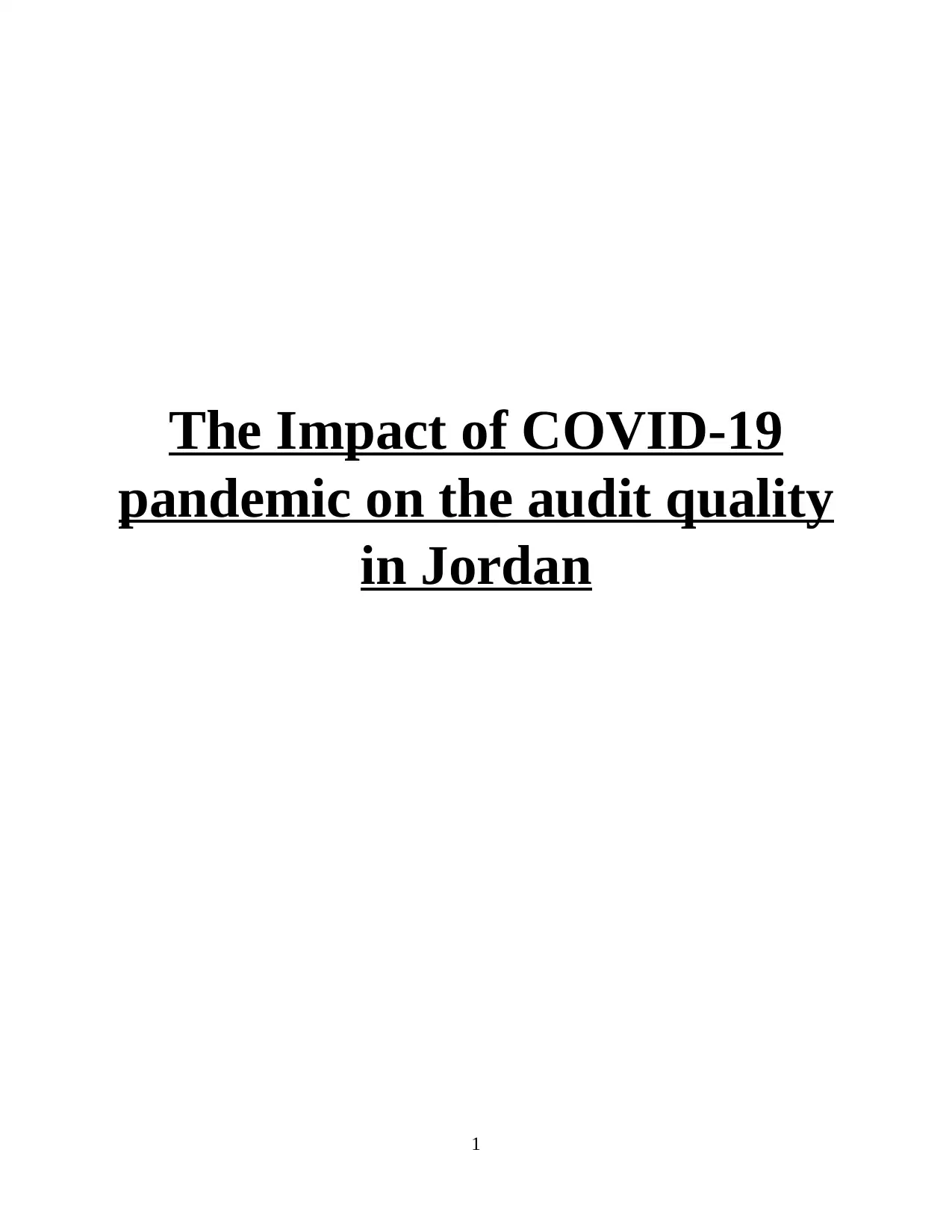
The Impact of COVID-19
pandemic on the audit quality
in Jordan
1
pandemic on the audit quality
in Jordan
1
Paraphrase This Document
Need a fresh take? Get an instant paraphrase of this document with our AI Paraphraser
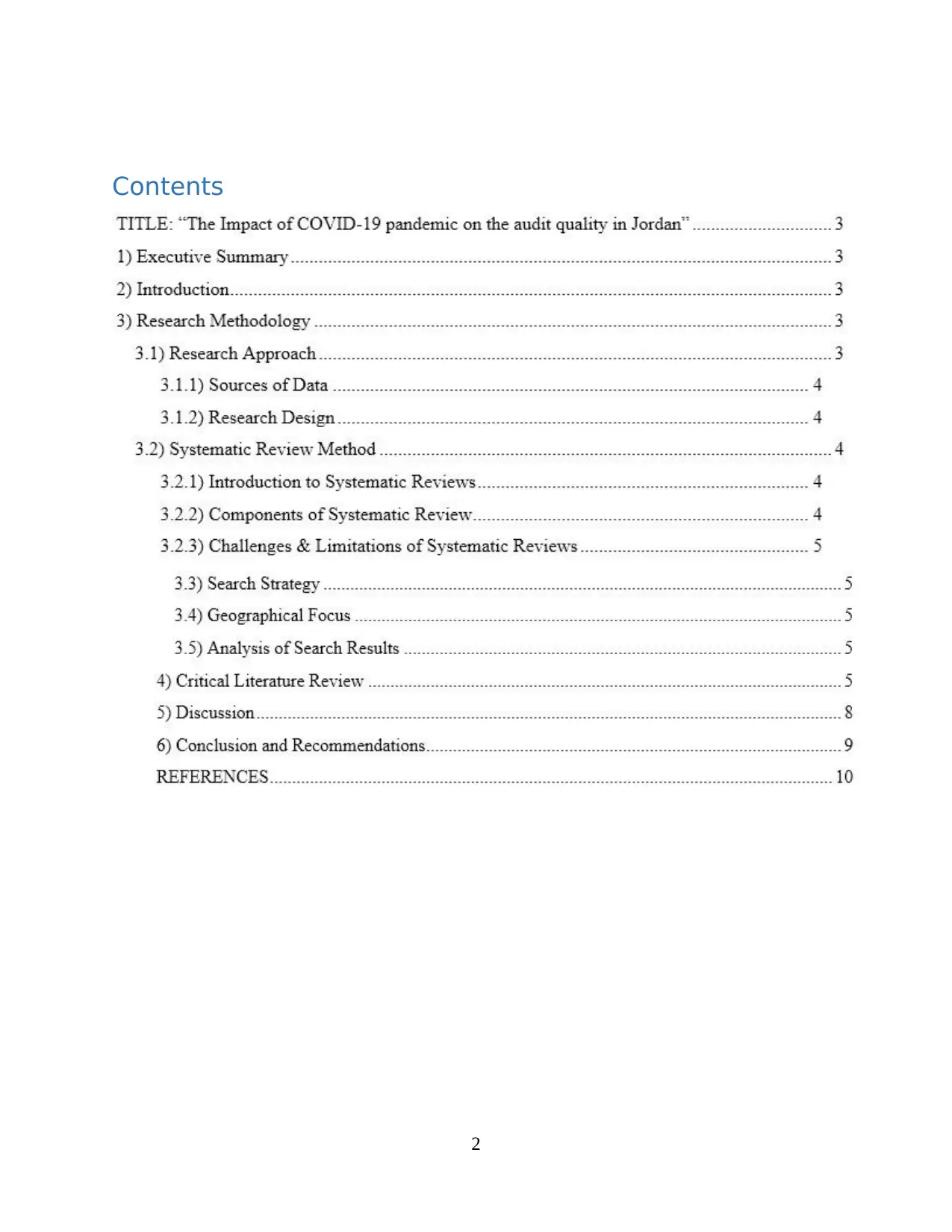
Contents
2
2
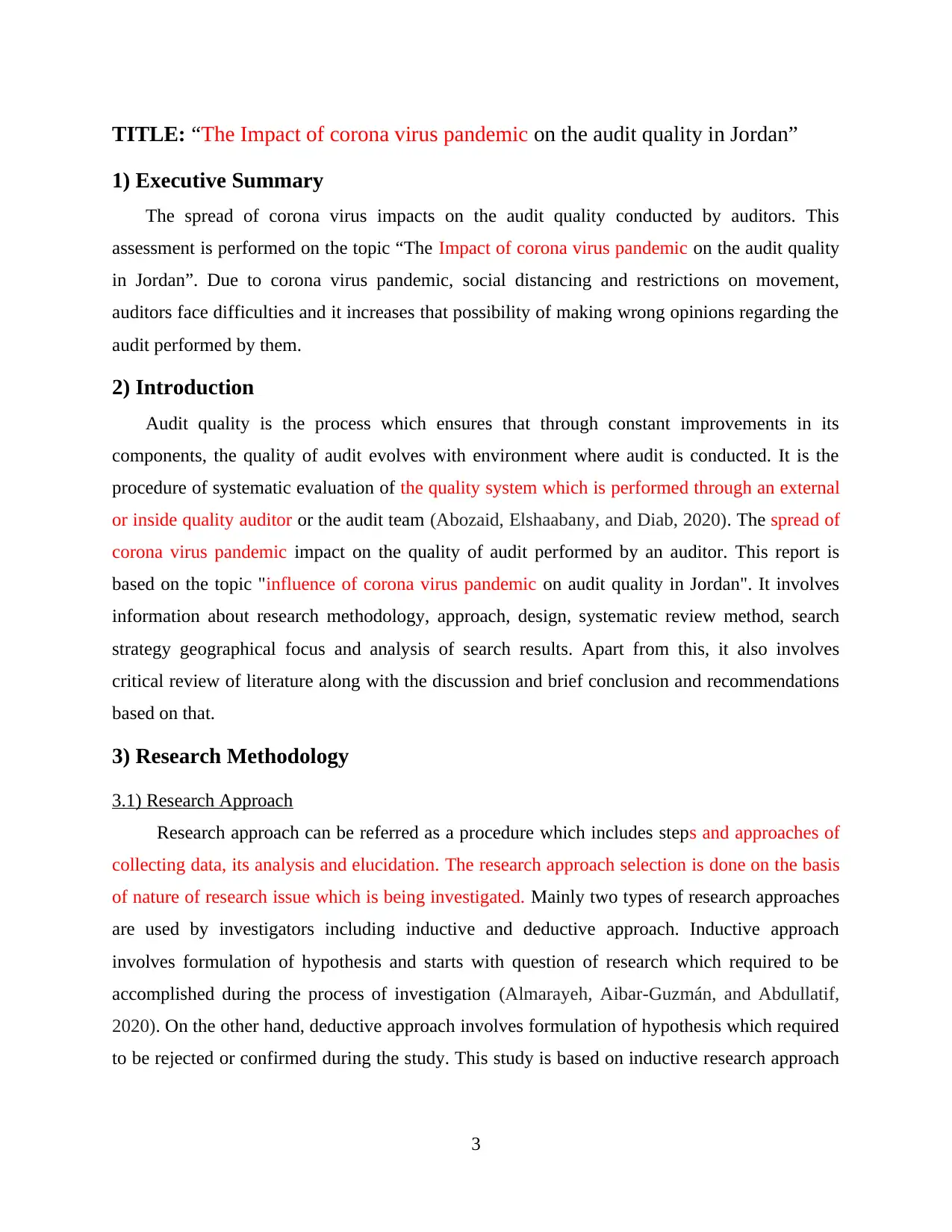
TITLE: “The Impact of corona virus pandemic on the audit quality in Jordan”
1) Executive Summary
The spread of corona virus impacts on the audit quality conducted by auditors. This
assessment is performed on the topic “The Impact of corona virus pandemic on the audit quality
in Jordan”. Due to corona virus pandemic, social distancing and restrictions on movement,
auditors face difficulties and it increases that possibility of making wrong opinions regarding the
audit performed by them.
2) Introduction
Audit quality is the process which ensures that through constant improvements in its
components, the quality of audit evolves with environment where audit is conducted. It is the
procedure of systematic evaluation of the quality system which is performed through an external
or inside quality auditor or the audit team (Abozaid, Elshaabany, and Diab, 2020). The spread of
corona virus pandemic impact on the quality of audit performed by an auditor. This report is
based on the topic "influence of corona virus pandemic on audit quality in Jordan". It involves
information about research methodology, approach, design, systematic review method, search
strategy geographical focus and analysis of search results. Apart from this, it also involves
critical review of literature along with the discussion and brief conclusion and recommendations
based on that.
3) Research Methodology
3.1) Research Approach
Research approach can be referred as a procedure which includes steps and approaches of
collecting data, its analysis and elucidation. The research approach selection is done on the basis
of nature of research issue which is being investigated. Mainly two types of research approaches
are used by investigators including inductive and deductive approach. Inductive approach
involves formulation of hypothesis and starts with question of research which required to be
accomplished during the process of investigation (Almarayeh, Aibar-Guzmán, and Abdullatif,
2020). On the other hand, deductive approach involves formulation of hypothesis which required
to be rejected or confirmed during the study. This study is based on inductive research approach
3
1) Executive Summary
The spread of corona virus impacts on the audit quality conducted by auditors. This
assessment is performed on the topic “The Impact of corona virus pandemic on the audit quality
in Jordan”. Due to corona virus pandemic, social distancing and restrictions on movement,
auditors face difficulties and it increases that possibility of making wrong opinions regarding the
audit performed by them.
2) Introduction
Audit quality is the process which ensures that through constant improvements in its
components, the quality of audit evolves with environment where audit is conducted. It is the
procedure of systematic evaluation of the quality system which is performed through an external
or inside quality auditor or the audit team (Abozaid, Elshaabany, and Diab, 2020). The spread of
corona virus pandemic impact on the quality of audit performed by an auditor. This report is
based on the topic "influence of corona virus pandemic on audit quality in Jordan". It involves
information about research methodology, approach, design, systematic review method, search
strategy geographical focus and analysis of search results. Apart from this, it also involves
critical review of literature along with the discussion and brief conclusion and recommendations
based on that.
3) Research Methodology
3.1) Research Approach
Research approach can be referred as a procedure which includes steps and approaches of
collecting data, its analysis and elucidation. The research approach selection is done on the basis
of nature of research issue which is being investigated. Mainly two types of research approaches
are used by investigators including inductive and deductive approach. Inductive approach
involves formulation of hypothesis and starts with question of research which required to be
accomplished during the process of investigation (Almarayeh, Aibar-Guzmán, and Abdullatif,
2020). On the other hand, deductive approach involves formulation of hypothesis which required
to be rejected or confirmed during the study. This study is based on inductive research approach
3
⊘ This is a preview!⊘
Do you want full access?
Subscribe today to unlock all pages.

Trusted by 1+ million students worldwide
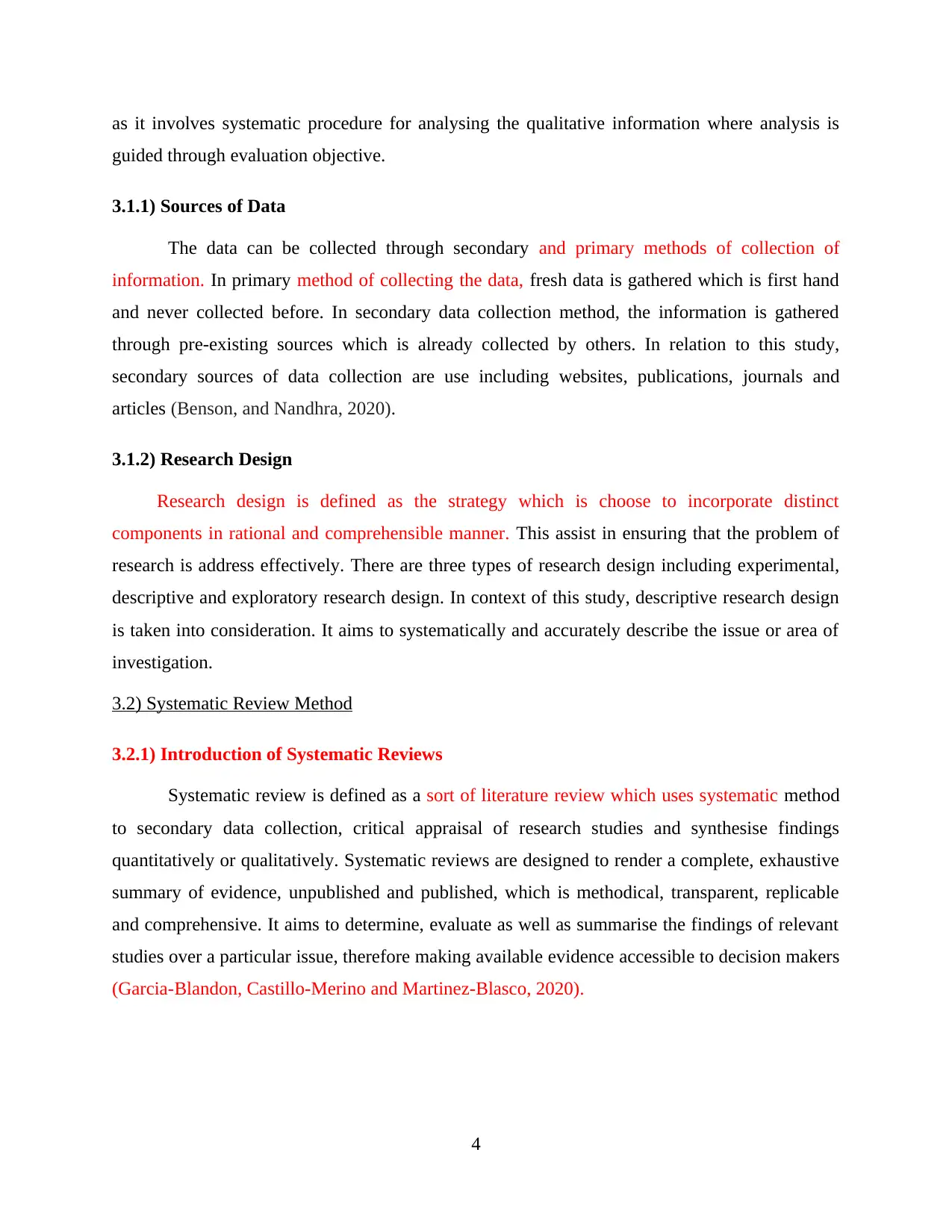
as it involves systematic procedure for analysing the qualitative information where analysis is
guided through evaluation objective.
3.1.1) Sources of Data
The data can be collected through secondary and primary methods of collection of
information. In primary method of collecting the data, fresh data is gathered which is first hand
and never collected before. In secondary data collection method, the information is gathered
through pre-existing sources which is already collected by others. In relation to this study,
secondary sources of data collection are use including websites, publications, journals and
articles (Benson, and Nandhra, 2020).
3.1.2) Research Design
Research design is defined as the strategy which is choose to incorporate distinct
components in rational and comprehensible manner. This assist in ensuring that the problem of
research is address effectively. There are three types of research design including experimental,
descriptive and exploratory research design. In context of this study, descriptive research design
is taken into consideration. It aims to systematically and accurately describe the issue or area of
investigation.
3.2) Systematic Review Method
3.2.1) Introduction of Systematic Reviews
Systematic review is defined as a sort of literature review which uses systematic method
to secondary data collection, critical appraisal of research studies and synthesise findings
quantitatively or qualitatively. Systematic reviews are designed to render a complete, exhaustive
summary of evidence, unpublished and published, which is methodical, transparent, replicable
and comprehensive. It aims to determine, evaluate as well as summarise the findings of relevant
studies over a particular issue, therefore making available evidence accessible to decision makers
(Garcia-Blandon, Castillo-Merino and Martinez-Blasco, 2020).
4
guided through evaluation objective.
3.1.1) Sources of Data
The data can be collected through secondary and primary methods of collection of
information. In primary method of collecting the data, fresh data is gathered which is first hand
and never collected before. In secondary data collection method, the information is gathered
through pre-existing sources which is already collected by others. In relation to this study,
secondary sources of data collection are use including websites, publications, journals and
articles (Benson, and Nandhra, 2020).
3.1.2) Research Design
Research design is defined as the strategy which is choose to incorporate distinct
components in rational and comprehensible manner. This assist in ensuring that the problem of
research is address effectively. There are three types of research design including experimental,
descriptive and exploratory research design. In context of this study, descriptive research design
is taken into consideration. It aims to systematically and accurately describe the issue or area of
investigation.
3.2) Systematic Review Method
3.2.1) Introduction of Systematic Reviews
Systematic review is defined as a sort of literature review which uses systematic method
to secondary data collection, critical appraisal of research studies and synthesise findings
quantitatively or qualitatively. Systematic reviews are designed to render a complete, exhaustive
summary of evidence, unpublished and published, which is methodical, transparent, replicable
and comprehensive. It aims to determine, evaluate as well as summarise the findings of relevant
studies over a particular issue, therefore making available evidence accessible to decision makers
(Garcia-Blandon, Castillo-Merino and Martinez-Blasco, 2020).
4
Paraphrase This Document
Need a fresh take? Get an instant paraphrase of this document with our AI Paraphraser
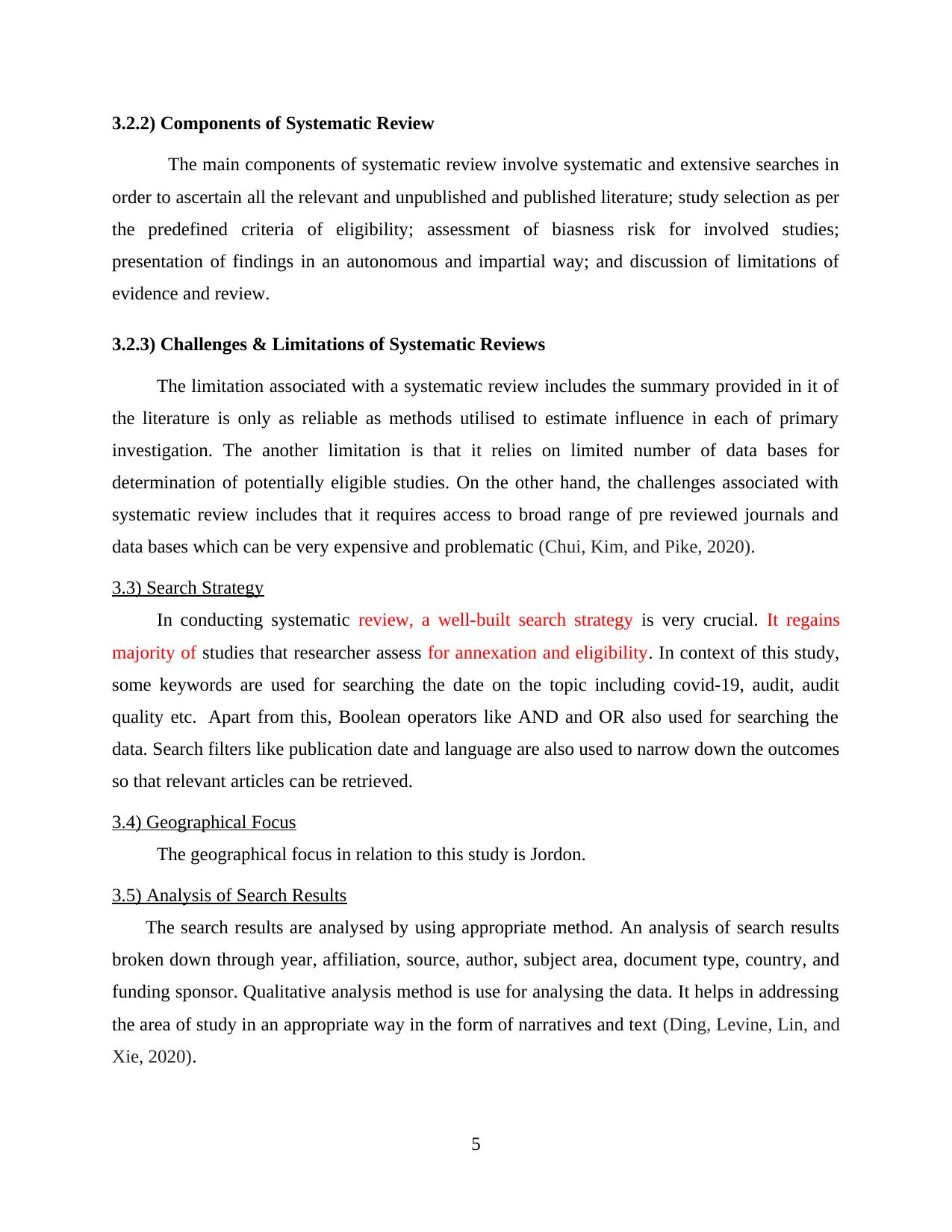
3.2.2) Components of Systematic Review
The main components of systematic review involve systematic and extensive searches in
order to ascertain all the relevant and unpublished and published literature; study selection as per
the predefined criteria of eligibility; assessment of biasness risk for involved studies;
presentation of findings in an autonomous and impartial way; and discussion of limitations of
evidence and review.
3.2.3) Challenges & Limitations of Systematic Reviews
The limitation associated with a systematic review includes the summary provided in it of
the literature is only as reliable as methods utilised to estimate influence in each of primary
investigation. The another limitation is that it relies on limited number of data bases for
determination of potentially eligible studies. On the other hand, the challenges associated with
systematic review includes that it requires access to broad range of pre reviewed journals and
data bases which can be very expensive and problematic (Chui, Kim, and Pike, 2020).
3.3) Search Strategy
In conducting systematic review, a well-built search strategy is very crucial. It regains
majority of studies that researcher assess for annexation and eligibility. In context of this study,
some keywords are used for searching the date on the topic including covid-19, audit, audit
quality etc. Apart from this, Boolean operators like AND and OR also used for searching the
data. Search filters like publication date and language are also used to narrow down the outcomes
so that relevant articles can be retrieved.
3.4) Geographical Focus
The geographical focus in relation to this study is Jordon.
3.5) Analysis of Search Results
The search results are analysed by using appropriate method. An analysis of search results
broken down through year, affiliation, source, author, subject area, document type, country, and
funding sponsor. Qualitative analysis method is use for analysing the data. It helps in addressing
the area of study in an appropriate way in the form of narratives and text (Ding, Levine, Lin, and
Xie, 2020).
5
The main components of systematic review involve systematic and extensive searches in
order to ascertain all the relevant and unpublished and published literature; study selection as per
the predefined criteria of eligibility; assessment of biasness risk for involved studies;
presentation of findings in an autonomous and impartial way; and discussion of limitations of
evidence and review.
3.2.3) Challenges & Limitations of Systematic Reviews
The limitation associated with a systematic review includes the summary provided in it of
the literature is only as reliable as methods utilised to estimate influence in each of primary
investigation. The another limitation is that it relies on limited number of data bases for
determination of potentially eligible studies. On the other hand, the challenges associated with
systematic review includes that it requires access to broad range of pre reviewed journals and
data bases which can be very expensive and problematic (Chui, Kim, and Pike, 2020).
3.3) Search Strategy
In conducting systematic review, a well-built search strategy is very crucial. It regains
majority of studies that researcher assess for annexation and eligibility. In context of this study,
some keywords are used for searching the date on the topic including covid-19, audit, audit
quality etc. Apart from this, Boolean operators like AND and OR also used for searching the
data. Search filters like publication date and language are also used to narrow down the outcomes
so that relevant articles can be retrieved.
3.4) Geographical Focus
The geographical focus in relation to this study is Jordon.
3.5) Analysis of Search Results
The search results are analysed by using appropriate method. An analysis of search results
broken down through year, affiliation, source, author, subject area, document type, country, and
funding sponsor. Qualitative analysis method is use for analysing the data. It helps in addressing
the area of study in an appropriate way in the form of narratives and text (Ding, Levine, Lin, and
Xie, 2020).
5
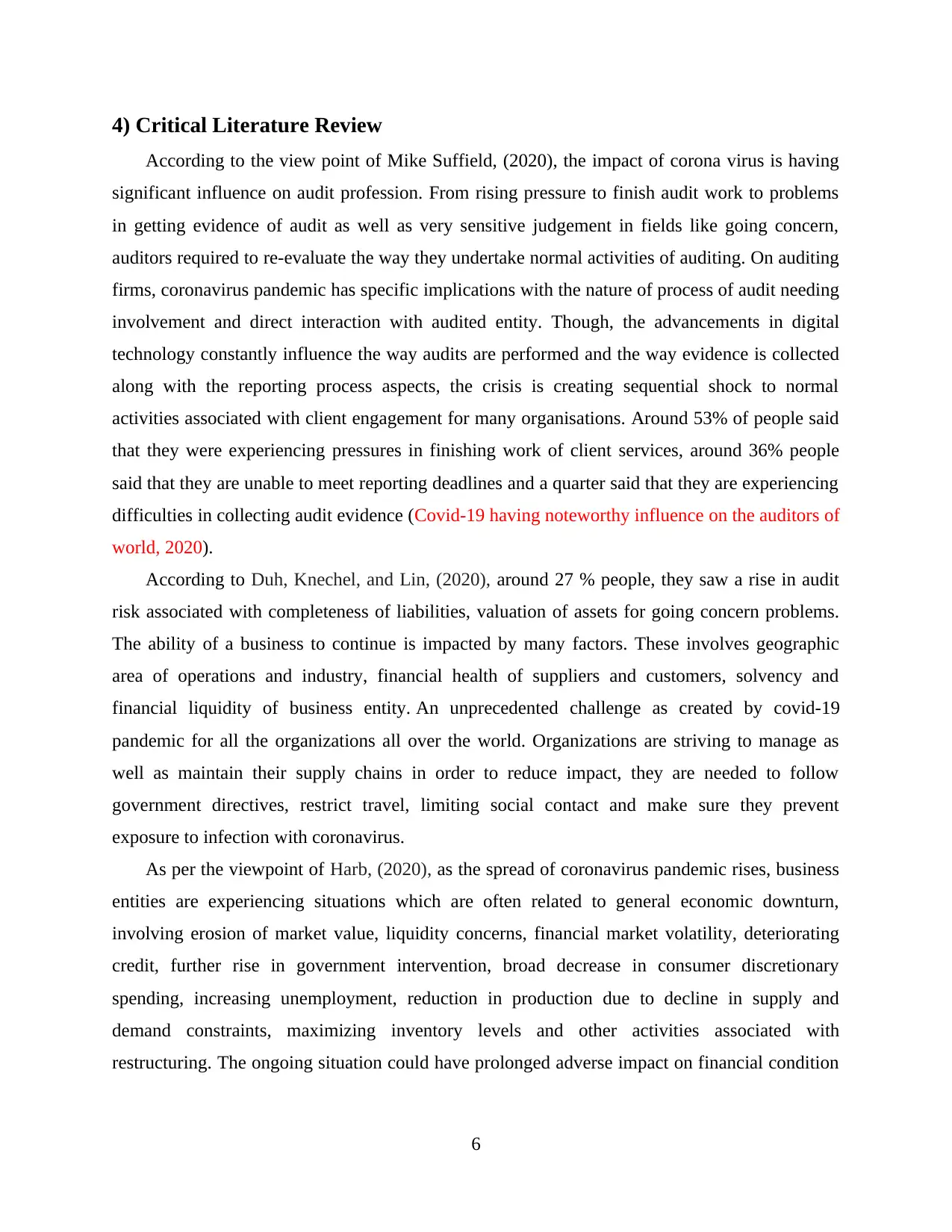
4) Critical Literature Review
According to the view point of Mike Suffield, (2020), the impact of corona virus is having
significant influence on audit profession. From rising pressure to finish audit work to problems
in getting evidence of audit as well as very sensitive judgement in fields like going concern,
auditors required to re-evaluate the way they undertake normal activities of auditing. On auditing
firms, coronavirus pandemic has specific implications with the nature of process of audit needing
involvement and direct interaction with audited entity. Though, the advancements in digital
technology constantly influence the way audits are performed and the way evidence is collected
along with the reporting process aspects, the crisis is creating sequential shock to normal
activities associated with client engagement for many organisations. Around 53% of people said
that they were experiencing pressures in finishing work of client services, around 36% people
said that they are unable to meet reporting deadlines and a quarter said that they are experiencing
difficulties in collecting audit evidence (Covid-19 having noteworthy influence on the auditors of
world, 2020).
According to Duh, Knechel, and Lin, (2020), around 27 % people, they saw a rise in audit
risk associated with completeness of liabilities, valuation of assets for going concern problems.
The ability of a business to continue is impacted by many factors. These involves geographic
area of operations and industry, financial health of suppliers and customers, solvency and
financial liquidity of business entity. An unprecedented challenge as created by covid-19
pandemic for all the organizations all over the world. Organizations are striving to manage as
well as maintain their supply chains in order to reduce impact, they are needed to follow
government directives, restrict travel, limiting social contact and make sure they prevent
exposure to infection with coronavirus.
As per the viewpoint of Harb, (2020), as the spread of coronavirus pandemic rises, business
entities are experiencing situations which are often related to general economic downturn,
involving erosion of market value, liquidity concerns, financial market volatility, deteriorating
credit, further rise in government intervention, broad decrease in consumer discretionary
spending, increasing unemployment, reduction in production due to decline in supply and
demand constraints, maximizing inventory levels and other activities associated with
restructuring. The ongoing situation could have prolonged adverse impact on financial condition
6
According to the view point of Mike Suffield, (2020), the impact of corona virus is having
significant influence on audit profession. From rising pressure to finish audit work to problems
in getting evidence of audit as well as very sensitive judgement in fields like going concern,
auditors required to re-evaluate the way they undertake normal activities of auditing. On auditing
firms, coronavirus pandemic has specific implications with the nature of process of audit needing
involvement and direct interaction with audited entity. Though, the advancements in digital
technology constantly influence the way audits are performed and the way evidence is collected
along with the reporting process aspects, the crisis is creating sequential shock to normal
activities associated with client engagement for many organisations. Around 53% of people said
that they were experiencing pressures in finishing work of client services, around 36% people
said that they are unable to meet reporting deadlines and a quarter said that they are experiencing
difficulties in collecting audit evidence (Covid-19 having noteworthy influence on the auditors of
world, 2020).
According to Duh, Knechel, and Lin, (2020), around 27 % people, they saw a rise in audit
risk associated with completeness of liabilities, valuation of assets for going concern problems.
The ability of a business to continue is impacted by many factors. These involves geographic
area of operations and industry, financial health of suppliers and customers, solvency and
financial liquidity of business entity. An unprecedented challenge as created by covid-19
pandemic for all the organizations all over the world. Organizations are striving to manage as
well as maintain their supply chains in order to reduce impact, they are needed to follow
government directives, restrict travel, limiting social contact and make sure they prevent
exposure to infection with coronavirus.
As per the viewpoint of Harb, (2020), as the spread of coronavirus pandemic rises, business
entities are experiencing situations which are often related to general economic downturn,
involving erosion of market value, liquidity concerns, financial market volatility, deteriorating
credit, further rise in government intervention, broad decrease in consumer discretionary
spending, increasing unemployment, reduction in production due to decline in supply and
demand constraints, maximizing inventory levels and other activities associated with
restructuring. The ongoing situation could have prolonged adverse impact on financial condition
6
⊘ This is a preview!⊘
Do you want full access?
Subscribe today to unlock all pages.

Trusted by 1+ million students worldwide
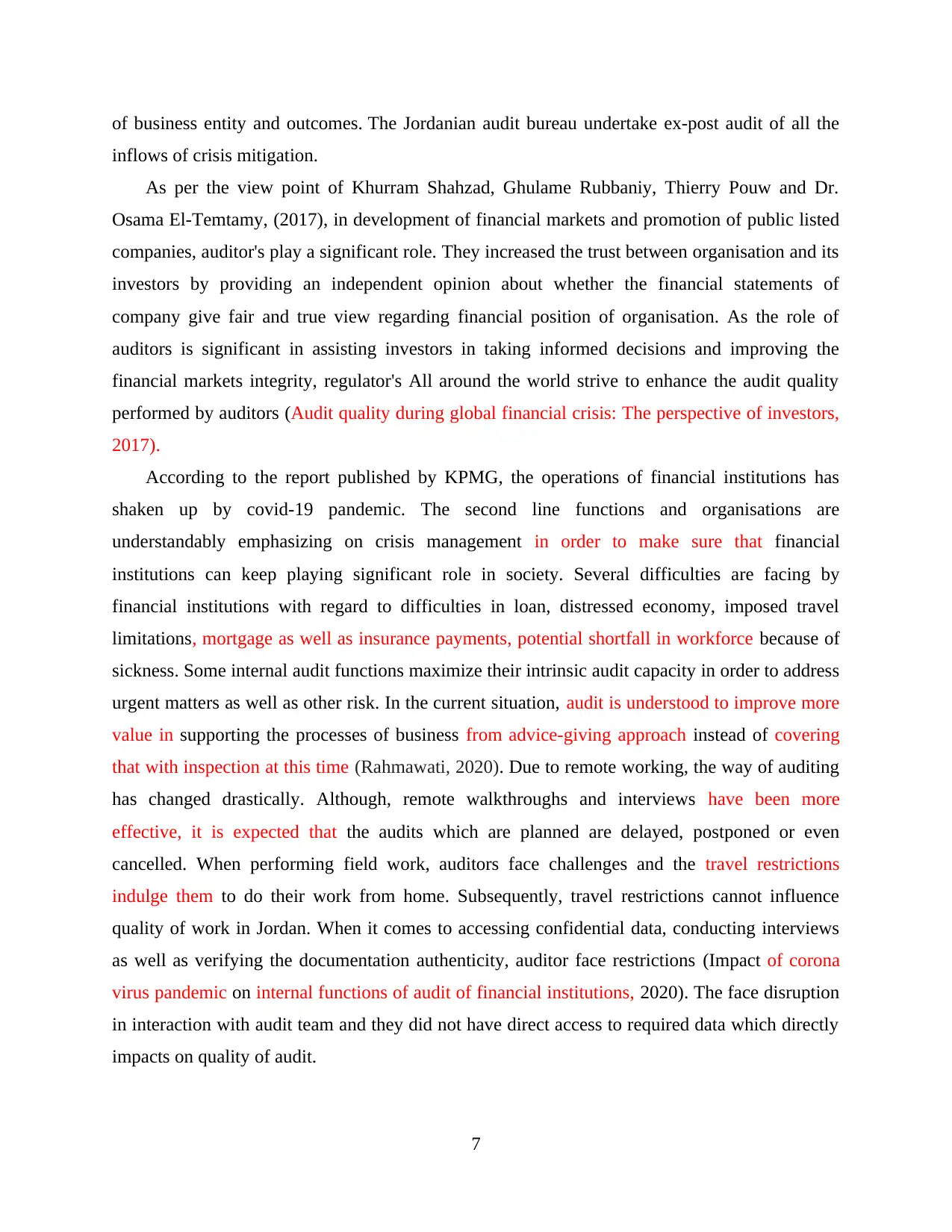
of business entity and outcomes. The Jordanian audit bureau undertake ex-post audit of all the
inflows of crisis mitigation.
As per the view point of Khurram Shahzad, Ghulame Rubbaniy, Thierry Pouw and Dr.
Osama El-Temtamy, (2017), in development of financial markets and promotion of public listed
companies, auditor's play a significant role. They increased the trust between organisation and its
investors by providing an independent opinion about whether the financial statements of
company give fair and true view regarding financial position of organisation. As the role of
auditors is significant in assisting investors in taking informed decisions and improving the
financial markets integrity, regulator's All around the world strive to enhance the audit quality
performed by auditors (Audit quality during global financial crisis: The perspective of investors,
2017).
According to the report published by KPMG, the operations of financial institutions has
shaken up by covid-19 pandemic. The second line functions and organisations are
understandably emphasizing on crisis management in order to make sure that financial
institutions can keep playing significant role in society. Several difficulties are facing by
financial institutions with regard to difficulties in loan, distressed economy, imposed travel
limitations, mortgage as well as insurance payments, potential shortfall in workforce because of
sickness. Some internal audit functions maximize their intrinsic audit capacity in order to address
urgent matters as well as other risk. In the current situation, audit is understood to improve more
value in supporting the processes of business from advice-giving approach instead of covering
that with inspection at this time (Rahmawati, 2020). Due to remote working, the way of auditing
has changed drastically. Although, remote walkthroughs and interviews have been more
effective, it is expected that the audits which are planned are delayed, postponed or even
cancelled. When performing field work, auditors face challenges and the travel restrictions
indulge them to do their work from home. Subsequently, travel restrictions cannot influence
quality of work in Jordan. When it comes to accessing confidential data, conducting interviews
as well as verifying the documentation authenticity, auditor face restrictions (Impact of corona
virus pandemic on internal functions of audit of financial institutions, 2020). The face disruption
in interaction with audit team and they did not have direct access to required data which directly
impacts on quality of audit.
7
inflows of crisis mitigation.
As per the view point of Khurram Shahzad, Ghulame Rubbaniy, Thierry Pouw and Dr.
Osama El-Temtamy, (2017), in development of financial markets and promotion of public listed
companies, auditor's play a significant role. They increased the trust between organisation and its
investors by providing an independent opinion about whether the financial statements of
company give fair and true view regarding financial position of organisation. As the role of
auditors is significant in assisting investors in taking informed decisions and improving the
financial markets integrity, regulator's All around the world strive to enhance the audit quality
performed by auditors (Audit quality during global financial crisis: The perspective of investors,
2017).
According to the report published by KPMG, the operations of financial institutions has
shaken up by covid-19 pandemic. The second line functions and organisations are
understandably emphasizing on crisis management in order to make sure that financial
institutions can keep playing significant role in society. Several difficulties are facing by
financial institutions with regard to difficulties in loan, distressed economy, imposed travel
limitations, mortgage as well as insurance payments, potential shortfall in workforce because of
sickness. Some internal audit functions maximize their intrinsic audit capacity in order to address
urgent matters as well as other risk. In the current situation, audit is understood to improve more
value in supporting the processes of business from advice-giving approach instead of covering
that with inspection at this time (Rahmawati, 2020). Due to remote working, the way of auditing
has changed drastically. Although, remote walkthroughs and interviews have been more
effective, it is expected that the audits which are planned are delayed, postponed or even
cancelled. When performing field work, auditors face challenges and the travel restrictions
indulge them to do their work from home. Subsequently, travel restrictions cannot influence
quality of work in Jordan. When it comes to accessing confidential data, conducting interviews
as well as verifying the documentation authenticity, auditor face restrictions (Impact of corona
virus pandemic on internal functions of audit of financial institutions, 2020). The face disruption
in interaction with audit team and they did not have direct access to required data which directly
impacts on quality of audit.
7
Paraphrase This Document
Need a fresh take? Get an instant paraphrase of this document with our AI Paraphraser
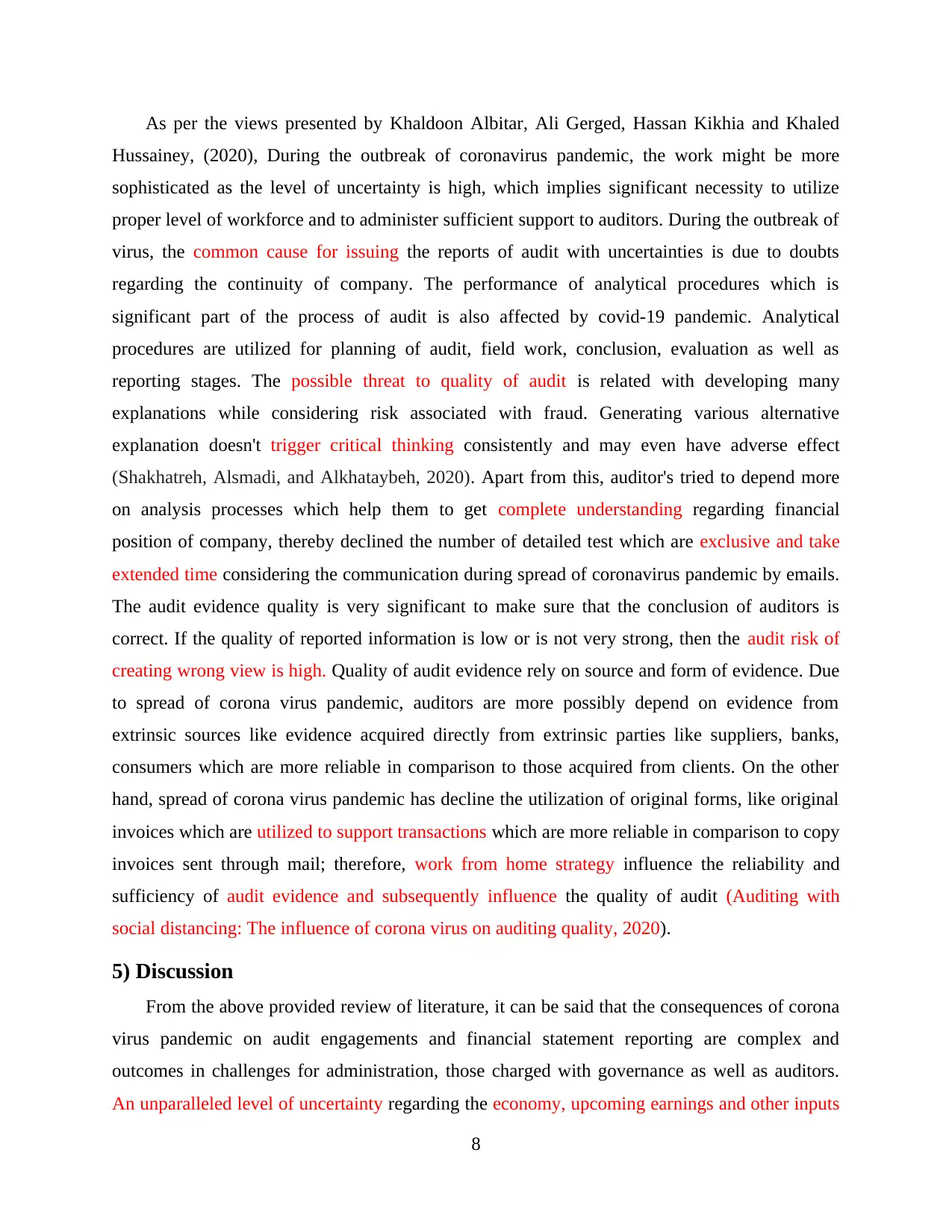
As per the views presented by Khaldoon Albitar, Ali Gerged, Hassan Kikhia and Khaled
Hussainey, (2020), During the outbreak of coronavirus pandemic, the work might be more
sophisticated as the level of uncertainty is high, which implies significant necessity to utilize
proper level of workforce and to administer sufficient support to auditors. During the outbreak of
virus, the common cause for issuing the reports of audit with uncertainties is due to doubts
regarding the continuity of company. The performance of analytical procedures which is
significant part of the process of audit is also affected by covid-19 pandemic. Analytical
procedures are utilized for planning of audit, field work, conclusion, evaluation as well as
reporting stages. The possible threat to quality of audit is related with developing many
explanations while considering risk associated with fraud. Generating various alternative
explanation doesn't trigger critical thinking consistently and may even have adverse effect
(Shakhatreh, Alsmadi, and Alkhataybeh, 2020). Apart from this, auditor's tried to depend more
on analysis processes which help them to get complete understanding regarding financial
position of company, thereby declined the number of detailed test which are exclusive and take
extended time considering the communication during spread of coronavirus pandemic by emails.
The audit evidence quality is very significant to make sure that the conclusion of auditors is
correct. If the quality of reported information is low or is not very strong, then the audit risk of
creating wrong view is high. Quality of audit evidence rely on source and form of evidence. Due
to spread of corona virus pandemic, auditors are more possibly depend on evidence from
extrinsic sources like evidence acquired directly from extrinsic parties like suppliers, banks,
consumers which are more reliable in comparison to those acquired from clients. On the other
hand, spread of corona virus pandemic has decline the utilization of original forms, like original
invoices which are utilized to support transactions which are more reliable in comparison to copy
invoices sent through mail; therefore, work from home strategy influence the reliability and
sufficiency of audit evidence and subsequently influence the quality of audit (Auditing with
social distancing: The influence of corona virus on auditing quality, 2020).
5) Discussion
From the above provided review of literature, it can be said that the consequences of corona
virus pandemic on audit engagements and financial statement reporting are complex and
outcomes in challenges for administration, those charged with governance as well as auditors.
An unparalleled level of uncertainty regarding the economy, upcoming earnings and other inputs
8
Hussainey, (2020), During the outbreak of coronavirus pandemic, the work might be more
sophisticated as the level of uncertainty is high, which implies significant necessity to utilize
proper level of workforce and to administer sufficient support to auditors. During the outbreak of
virus, the common cause for issuing the reports of audit with uncertainties is due to doubts
regarding the continuity of company. The performance of analytical procedures which is
significant part of the process of audit is also affected by covid-19 pandemic. Analytical
procedures are utilized for planning of audit, field work, conclusion, evaluation as well as
reporting stages. The possible threat to quality of audit is related with developing many
explanations while considering risk associated with fraud. Generating various alternative
explanation doesn't trigger critical thinking consistently and may even have adverse effect
(Shakhatreh, Alsmadi, and Alkhataybeh, 2020). Apart from this, auditor's tried to depend more
on analysis processes which help them to get complete understanding regarding financial
position of company, thereby declined the number of detailed test which are exclusive and take
extended time considering the communication during spread of coronavirus pandemic by emails.
The audit evidence quality is very significant to make sure that the conclusion of auditors is
correct. If the quality of reported information is low or is not very strong, then the audit risk of
creating wrong view is high. Quality of audit evidence rely on source and form of evidence. Due
to spread of corona virus pandemic, auditors are more possibly depend on evidence from
extrinsic sources like evidence acquired directly from extrinsic parties like suppliers, banks,
consumers which are more reliable in comparison to those acquired from clients. On the other
hand, spread of corona virus pandemic has decline the utilization of original forms, like original
invoices which are utilized to support transactions which are more reliable in comparison to copy
invoices sent through mail; therefore, work from home strategy influence the reliability and
sufficiency of audit evidence and subsequently influence the quality of audit (Auditing with
social distancing: The influence of corona virus on auditing quality, 2020).
5) Discussion
From the above provided review of literature, it can be said that the consequences of corona
virus pandemic on audit engagements and financial statement reporting are complex and
outcomes in challenges for administration, those charged with governance as well as auditors.
An unparalleled level of uncertainty regarding the economy, upcoming earnings and other inputs
8
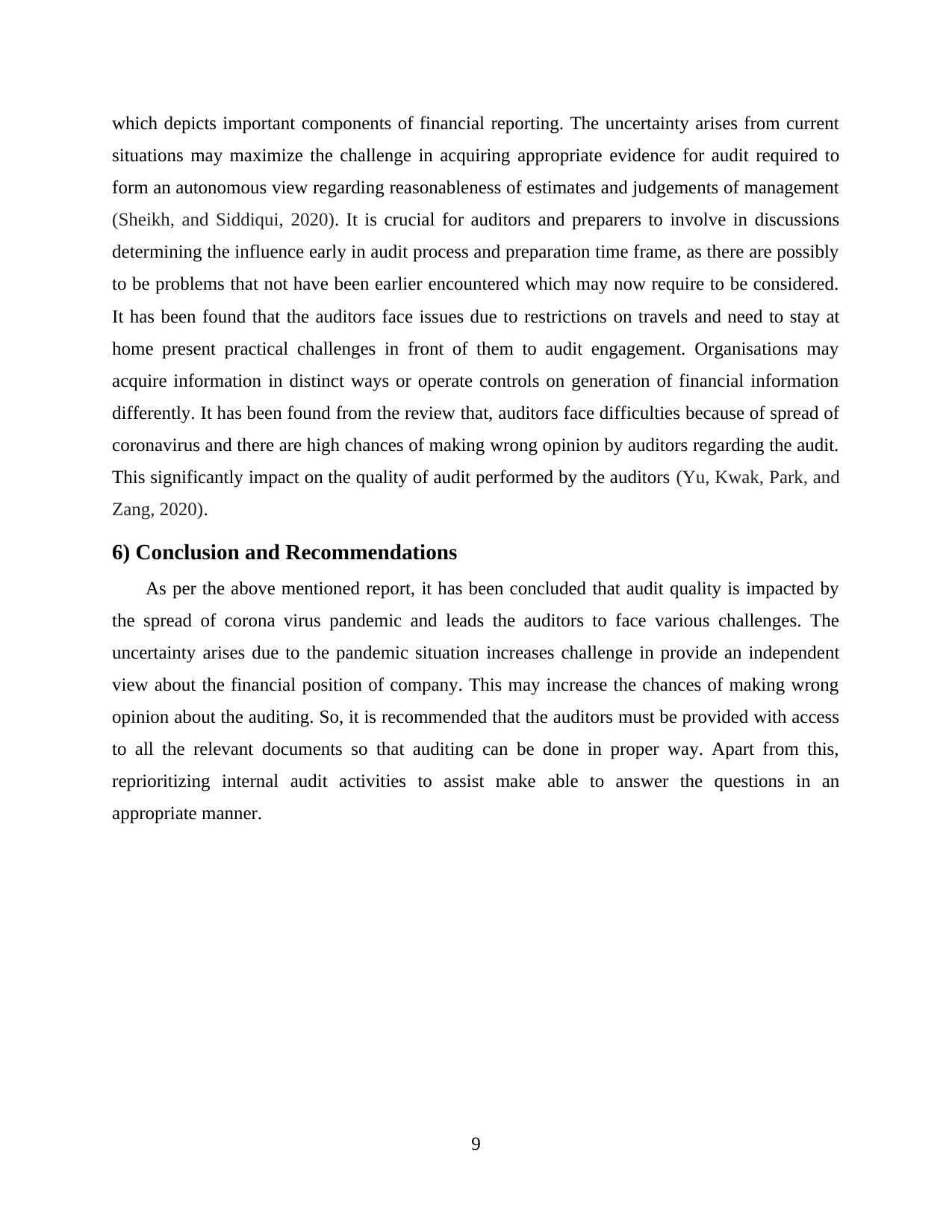
which depicts important components of financial reporting. The uncertainty arises from current
situations may maximize the challenge in acquiring appropriate evidence for audit required to
form an autonomous view regarding reasonableness of estimates and judgements of management
(Sheikh, and Siddiqui, 2020). It is crucial for auditors and preparers to involve in discussions
determining the influence early in audit process and preparation time frame, as there are possibly
to be problems that not have been earlier encountered which may now require to be considered.
It has been found that the auditors face issues due to restrictions on travels and need to stay at
home present practical challenges in front of them to audit engagement. Organisations may
acquire information in distinct ways or operate controls on generation of financial information
differently. It has been found from the review that, auditors face difficulties because of spread of
coronavirus and there are high chances of making wrong opinion by auditors regarding the audit.
This significantly impact on the quality of audit performed by the auditors (Yu, Kwak, Park, and
Zang, 2020).
6) Conclusion and Recommendations
As per the above mentioned report, it has been concluded that audit quality is impacted by
the spread of corona virus pandemic and leads the auditors to face various challenges. The
uncertainty arises due to the pandemic situation increases challenge in provide an independent
view about the financial position of company. This may increase the chances of making wrong
opinion about the auditing. So, it is recommended that the auditors must be provided with access
to all the relevant documents so that auditing can be done in proper way. Apart from this,
reprioritizing internal audit activities to assist make able to answer the questions in an
appropriate manner.
9
situations may maximize the challenge in acquiring appropriate evidence for audit required to
form an autonomous view regarding reasonableness of estimates and judgements of management
(Sheikh, and Siddiqui, 2020). It is crucial for auditors and preparers to involve in discussions
determining the influence early in audit process and preparation time frame, as there are possibly
to be problems that not have been earlier encountered which may now require to be considered.
It has been found that the auditors face issues due to restrictions on travels and need to stay at
home present practical challenges in front of them to audit engagement. Organisations may
acquire information in distinct ways or operate controls on generation of financial information
differently. It has been found from the review that, auditors face difficulties because of spread of
coronavirus and there are high chances of making wrong opinion by auditors regarding the audit.
This significantly impact on the quality of audit performed by the auditors (Yu, Kwak, Park, and
Zang, 2020).
6) Conclusion and Recommendations
As per the above mentioned report, it has been concluded that audit quality is impacted by
the spread of corona virus pandemic and leads the auditors to face various challenges. The
uncertainty arises due to the pandemic situation increases challenge in provide an independent
view about the financial position of company. This may increase the chances of making wrong
opinion about the auditing. So, it is recommended that the auditors must be provided with access
to all the relevant documents so that auditing can be done in proper way. Apart from this,
reprioritizing internal audit activities to assist make able to answer the questions in an
appropriate manner.
9
⊘ This is a preview!⊘
Do you want full access?
Subscribe today to unlock all pages.

Trusted by 1+ million students worldwide
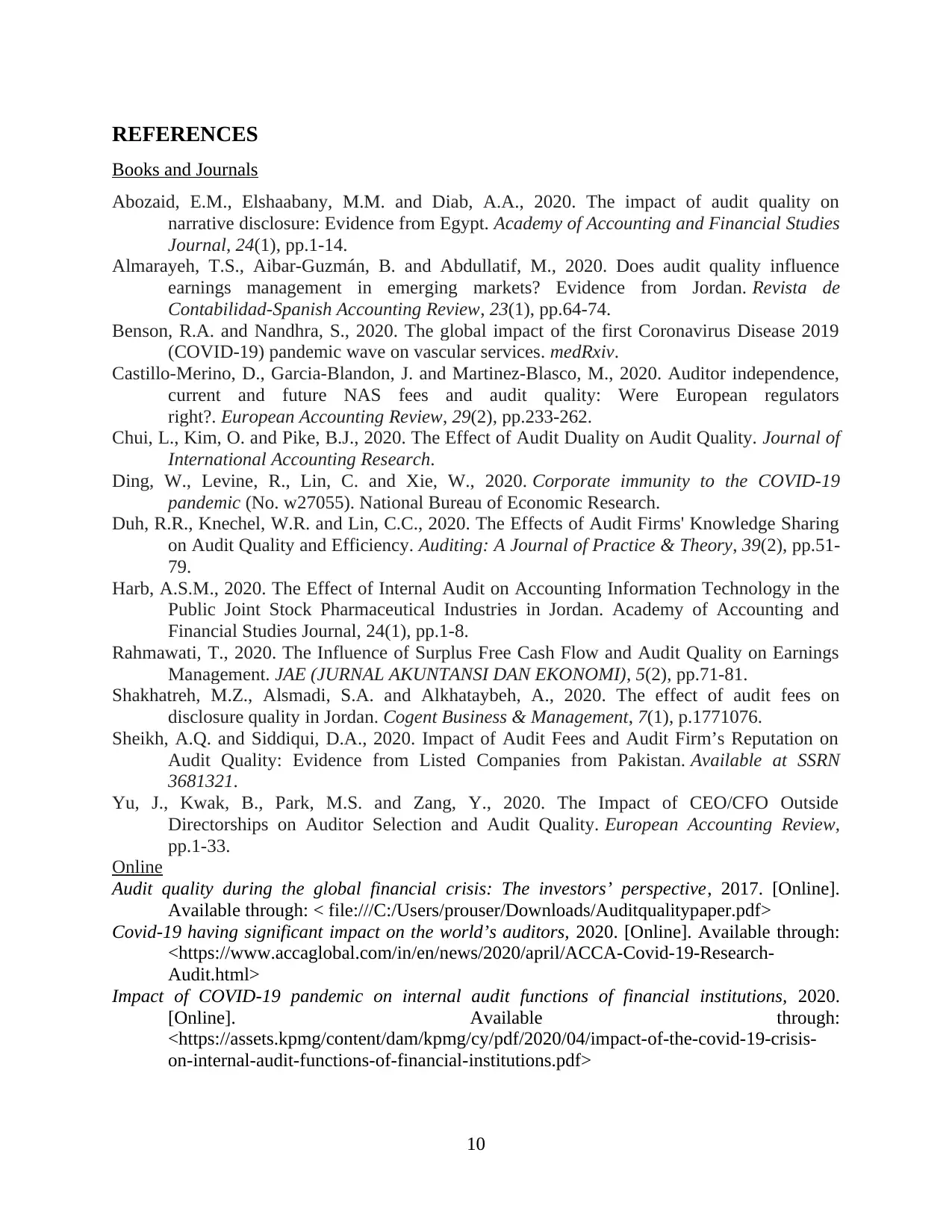
REFERENCES
Books and Journals
Abozaid, E.M., Elshaabany, M.M. and Diab, A.A., 2020. The impact of audit quality on
narrative disclosure: Evidence from Egypt. Academy of Accounting and Financial Studies
Journal, 24(1), pp.1-14.
Almarayeh, T.S., Aibar-Guzmán, B. and Abdullatif, M., 2020. Does audit quality influence
earnings management in emerging markets? Evidence from Jordan. Revista de
Contabilidad-Spanish Accounting Review, 23(1), pp.64-74.
Benson, R.A. and Nandhra, S., 2020. The global impact of the first Coronavirus Disease 2019
(COVID-19) pandemic wave on vascular services. medRxiv.
Castillo-Merino, D., Garcia-Blandon, J. and Martinez-Blasco, M., 2020. Auditor independence,
current and future NAS fees and audit quality: Were European regulators
right?. European Accounting Review, 29(2), pp.233-262.
Chui, L., Kim, O. and Pike, B.J., 2020. The Effect of Audit Duality on Audit Quality. Journal of
International Accounting Research.
Ding, W., Levine, R., Lin, C. and Xie, W., 2020. Corporate immunity to the COVID-19
pandemic (No. w27055). National Bureau of Economic Research.
Duh, R.R., Knechel, W.R. and Lin, C.C., 2020. The Effects of Audit Firms' Knowledge Sharing
on Audit Quality and Efficiency. Auditing: A Journal of Practice & Theory, 39(2), pp.51-
79.
Harb, A.S.M., 2020. The Effect of Internal Audit on Accounting Information Technology in the
Public Joint Stock Pharmaceutical Industries in Jordan. Academy of Accounting and
Financial Studies Journal, 24(1), pp.1-8.
Rahmawati, T., 2020. The Influence of Surplus Free Cash Flow and Audit Quality on Earnings
Management. JAE (JURNAL AKUNTANSI DAN EKONOMI), 5(2), pp.71-81.
Shakhatreh, M.Z., Alsmadi, S.A. and Alkhataybeh, A., 2020. The effect of audit fees on
disclosure quality in Jordan. Cogent Business & Management, 7(1), p.1771076.
Sheikh, A.Q. and Siddiqui, D.A., 2020. Impact of Audit Fees and Audit Firm’s Reputation on
Audit Quality: Evidence from Listed Companies from Pakistan. Available at SSRN
3681321.
Yu, J., Kwak, B., Park, M.S. and Zang, Y., 2020. The Impact of CEO/CFO Outside
Directorships on Auditor Selection and Audit Quality. European Accounting Review,
pp.1-33.
Online
Audit quality during the global financial crisis: The investors’ perspective, 2017. [Online].
Available through: < file:///C:/Users/prouser/Downloads/Auditqualitypaper.pdf>
Covid-19 having significant impact on the world’s auditors, 2020. [Online]. Available through:
<https://www.accaglobal.com/in/en/news/2020/april/ACCA-Covid-19-Research-
Audit.html>
Impact of COVID-19 pandemic on internal audit functions of financial institutions, 2020.
[Online]. Available through:
<https://assets.kpmg/content/dam/kpmg/cy/pdf/2020/04/impact-of-the-covid-19-crisis-
on-internal-audit-functions-of-financial-institutions.pdf>
10
Books and Journals
Abozaid, E.M., Elshaabany, M.M. and Diab, A.A., 2020. The impact of audit quality on
narrative disclosure: Evidence from Egypt. Academy of Accounting and Financial Studies
Journal, 24(1), pp.1-14.
Almarayeh, T.S., Aibar-Guzmán, B. and Abdullatif, M., 2020. Does audit quality influence
earnings management in emerging markets? Evidence from Jordan. Revista de
Contabilidad-Spanish Accounting Review, 23(1), pp.64-74.
Benson, R.A. and Nandhra, S., 2020. The global impact of the first Coronavirus Disease 2019
(COVID-19) pandemic wave on vascular services. medRxiv.
Castillo-Merino, D., Garcia-Blandon, J. and Martinez-Blasco, M., 2020. Auditor independence,
current and future NAS fees and audit quality: Were European regulators
right?. European Accounting Review, 29(2), pp.233-262.
Chui, L., Kim, O. and Pike, B.J., 2020. The Effect of Audit Duality on Audit Quality. Journal of
International Accounting Research.
Ding, W., Levine, R., Lin, C. and Xie, W., 2020. Corporate immunity to the COVID-19
pandemic (No. w27055). National Bureau of Economic Research.
Duh, R.R., Knechel, W.R. and Lin, C.C., 2020. The Effects of Audit Firms' Knowledge Sharing
on Audit Quality and Efficiency. Auditing: A Journal of Practice & Theory, 39(2), pp.51-
79.
Harb, A.S.M., 2020. The Effect of Internal Audit on Accounting Information Technology in the
Public Joint Stock Pharmaceutical Industries in Jordan. Academy of Accounting and
Financial Studies Journal, 24(1), pp.1-8.
Rahmawati, T., 2020. The Influence of Surplus Free Cash Flow and Audit Quality on Earnings
Management. JAE (JURNAL AKUNTANSI DAN EKONOMI), 5(2), pp.71-81.
Shakhatreh, M.Z., Alsmadi, S.A. and Alkhataybeh, A., 2020. The effect of audit fees on
disclosure quality in Jordan. Cogent Business & Management, 7(1), p.1771076.
Sheikh, A.Q. and Siddiqui, D.A., 2020. Impact of Audit Fees and Audit Firm’s Reputation on
Audit Quality: Evidence from Listed Companies from Pakistan. Available at SSRN
3681321.
Yu, J., Kwak, B., Park, M.S. and Zang, Y., 2020. The Impact of CEO/CFO Outside
Directorships on Auditor Selection and Audit Quality. European Accounting Review,
pp.1-33.
Online
Audit quality during the global financial crisis: The investors’ perspective, 2017. [Online].
Available through: < file:///C:/Users/prouser/Downloads/Auditqualitypaper.pdf>
Covid-19 having significant impact on the world’s auditors, 2020. [Online]. Available through:
<https://www.accaglobal.com/in/en/news/2020/april/ACCA-Covid-19-Research-
Audit.html>
Impact of COVID-19 pandemic on internal audit functions of financial institutions, 2020.
[Online]. Available through:
<https://assets.kpmg/content/dam/kpmg/cy/pdf/2020/04/impact-of-the-covid-19-crisis-
on-internal-audit-functions-of-financial-institutions.pdf>
10
Paraphrase This Document
Need a fresh take? Get an instant paraphrase of this document with our AI Paraphraser
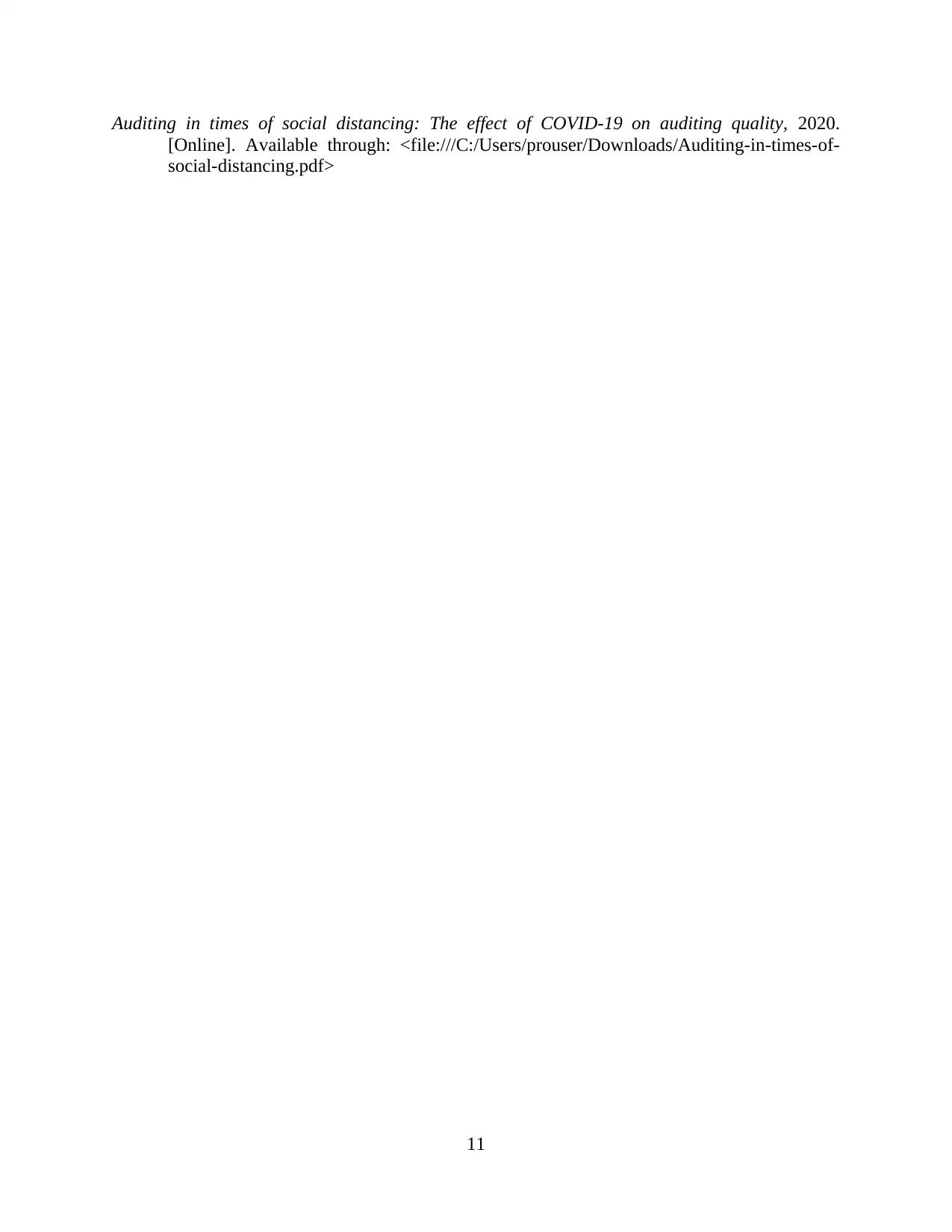
Auditing in times of social distancing: The effect of COVID-19 on auditing quality, 2020.
[Online]. Available through: <file:///C:/Users/prouser/Downloads/Auditing-in-times-of-
social-distancing.pdf>
11
[Online]. Available through: <file:///C:/Users/prouser/Downloads/Auditing-in-times-of-
social-distancing.pdf>
11
1 out of 11
Related Documents
Your All-in-One AI-Powered Toolkit for Academic Success.
+13062052269
info@desklib.com
Available 24*7 on WhatsApp / Email
![[object Object]](/_next/static/media/star-bottom.7253800d.svg)
Unlock your academic potential
Copyright © 2020–2025 A2Z Services. All Rights Reserved. Developed and managed by ZUCOL.





